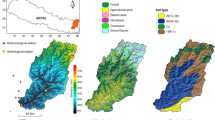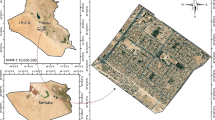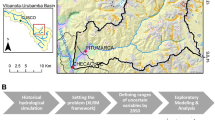Abstract
Global change in climate and consequent large impacts on regional hydrologic systems have, in recent years, motivated significant research efforts in water resources modeling under climate change. In an integrated future hydrologic scenario, it is likely that water availability and demands will change significantly due to modifications in hydro-climatic variables such as rainfall, reservoir inflows, temperature, net radiation, wind speed and humidity. An integrated regional water resources management model should capture the likely impacts of climate change on water demands and water availability along with uncertainties associated with climate change impacts and with management goals and objectives under non-stationary conditions. Uncertainties in an integrated regional water resources management model, accumulating from various stages of decision making include climate model and scenario uncertainty in the hydro-climatic impact assessment, uncertainty due to conflicting interests of the water users and uncertainty due to inherent variability of the reservoir inflows. This paper presents an integrated regional water resources management modeling approach considering uncertainties at various stages of decision making by an integration of a hydro-climatic variable projection model, a water demand quantification model, a water quantity management model and a water quality control model. Modeling tools of canonical correlation analysis, stochastic dynamic programming and fuzzy optimization are used in an integrated framework, in the approach presented here. The proposed modeling approach is demonstrated with the case study of the Bhadra Reservoir system in Karnataka, India.








Similar content being viewed by others
References
Akter T, Simonovic SP (2004) Modeling uncertainties in short term reservoir operation using fuzzy sets and genetic algorithm. Hydrol Sci J 49(6):1081–1097
Arnell NW (2004) Climate change and global water resources: SRES emissions and socio—economic scenarios. Glob Environ Chang 14:31–52
Asokan SM, Dutta D (2008) Analysis of water resources in the Mahanadi River Basin, India under projected climate conditions. Hydrol Process 22:3589–3603
Binoy AM (2005) Integration of water quality and quantity control in a reservoir system, Ph.D. thesis, Dep. of Civil Engg., Indian Institute of Science, Bangalore, India
Burn HD, Simonovic SP (1996) Sensitivity of reservoir operation performance to climatic change. Water Resour Manag J 10(6):463–478
Chapra SC (1998) Surface water quality modelling. McGraw Hill Kogakusha Ltd., New York
Chaves P, Kojiri T, Yamashiki Y (2003) Optimization of storage reservoir considering water quantity and quality. Hydrol Process 17(14):2769–2793
Chen J, Brissette FP, Poulin A, Leconte R (2011) Overall uncertainty study of the hydrological impacts of climate change for a Canadian watershed. Water Resour Res 47, W12509. doi:10.1029/2011WR010602
Davies EGR, Simonovic SP (2010) ANEMI: a new model for integrated assessment of global change. Interdiscip Environ Rev 11(2/3):127–161. doi:10.1504/IER.2010.037903
Davies EGR, Simonovic SP (2011) Water resources and integrated assessment modeling—the ANEMI model. Adv Water Resour 34:684–700, available online 18 February 2011
Dibike YB, Coulibaly P (2005) Hydrologic impact of climate change in the saguenay watershed: comparison of downscaling methods and hydrologic models. J Hydrol 307(1–4):145–163
Eum H-I, Simonovic SP (2010) Integrated reservoir management system for adaptation to climate change: the Nakdong River Basin in Korea. Water Resour Manag 24(13):3397–3417
Eum H-I, Vasan A, Simonovic SP (2012) Integrated reservoir management system for flood risk assessment under climate change. Water Resour Manag 26(13):3785–3802
Fisher AC, Rubio SJ (1997) Adjusting to climate change: implications of increased variability and asymmetric adjustment costs for investment in water reserves. J Environ Econ Manag 34(3):207–227
Ghosh S, Mujumdar PP (2009) Climate change impact assessment: uncertainty modeling with imprecise probability. J Geophys Res 114, D18113. doi:10.1029/2008JD011648
Giorgi F, Mearns LO (2002) Calculation of average, uncertainty range, and reliability of regional climate changes from AOGCM simulations via the “reliability ensemble averaging” (REA) method. J Clim 15(10):1141–1158
Kalnay E, Kanamitsu M, Kistler R, Collins W, Deaven D, GandinbL IM, Saha S, White G, Woolen J, Zhu Y, Chelliah M, Ebisuzaki W, Higgins W, Janowiak J, Mo KC, Ropelewski C, Wang J, Leetma A, Reynolds R, Jenne R, Joseph D (1996) The NCEP/NCAR 40-year reanalysis project. Bull Am Meteorol Soc 77:437–471
Khan MS, Coulibaly P, Dibike Y (2006) Uncertainty analysis of statistical downscaling methods. J Hydrol 319:357–382
King LMM, Irwin S, Sarwar R, McLeod AIA, Simonovic SP (2012) The effects of climate change on extreme precipitation events in the Upper Thames River Basin: a comparison of downscaling approaches. Canadian Water Resour J 37(3):253–274
Lee J-H, Labadie JW (2007) Stochastic optimization of multireservoir systems via reinforcement learning. Water Resour Res 43, W11408. doi:10.1029/2006WR005627
Loucks DP, Stedinger JR, Haith DH (1981) Water resources systems planning and analysis. Prentice Hall, Eaglewood Cliffs
Majone B, Bovolo CI, Bellin A, Blenkinsop S, Fowler HJ (2012) Modeling the impacts of future climate change on water resources for the Gállego River Basin (Spain). Water Resour Res 48, W01512. doi:10.1029/2011WR010985
Meenu R, Rehana S, Mujumdar PP (2013) Assessment of hydrologic impacts of climate change in Tunga-Bhadra River Basin, India with HEC-HMS and SDSM. Hydrol Process 27(11):1572–1589
Mujumdar PP, Ghosh S (2008) Modeling GCM and scenario uncertainty using a possibilistic approach: application to the Mahanadi River, India. Water Resour Res 44, W06407. doi:10.1029/2007WR006137
Nikoo MR, Karimi A, Kerachian R (2013) Optimal long-term operation of reservoir-river systems under hydrologic uncertainties: application of interval programming. Water Resour Res 27(11):3865–3883
Orlob GT, Simonovic S (1982) Reservoir operation for water quality control. In: Unny TE, McBean EA (eds) Experience in operation of hydrosystems. Water Resour. Pub, Littleton, pp 263–285
Prudhomme C, Davies H (2009) Assessing uncertainties in climate change impact analyses on the river flow regimes in the UK. Part 2: future climate. Clim Chang 93(1–2):197–222
Raje D, Mujumdar PP (2010) Reservoir performance under uncertainty in hydrologic impacts of climate change. Adv Water Resour 33(3):312–326
Rehana S, Mujumdar PP (2009) An imprecise fuzzy risk approach for water quality management of a river system. J Environ Manag 90(11):3653–3664
Rehana S, Mujumdar PP (2011) River water quality response under hypothetical climate change scenarios in Tunga-Bhadra River, India. Hydrol Process 25(22):3373–3386
Rehana S, Mujumdar PP (2012) Climate change induced risk in water quality control problems. J Hydrol 444–445:63–77
Rehana S, Mujumdar PP (2013) Regional impacts of climate change on irrigation water demands. Hydrol Process 27(20):2918–2933
Sasikumar K, Mujumdar PP (1998) Fuzzy optimization model for water quality management of a river system. J Water Resour Plan Manag 124(2):79–88
Simonovic SP (2010) A new methodology for the assessment of climate change impacts on a watershed scale. Curr Sci 98(8):1047–1055
Simonovic SP, Li L (2004) Sensitivity of the Red River basin flood protection system to climate variability and change. Water Resour Manag 18(2):89–110
Tebaldi C, Mearns LO, Nychka D, Smith RL (2004), Regional probabilities of precipitation change: a Bayesian analysis of multimodel simulations. Geophys Res Lett. 31(24)
Teegavarapu RSV, Simonovic SP (1999) Modeling uncertainty in reservoir loss functions using fuzzy sets. Water Resour Res 35(9):2815–2823
Teutschbein C, Wetterhall F, Seibert J (2011) Evaluation of different downscaling techniques for hydrological climate-change impact studies at the catchment scale. Clim Dyn 37(9–10):2087–2105. doi:10.1007/s00382-010-0979-8
Vicuna S, Dracup JA, Lund JR, Dale LL, Maurer EP (2010) Basin scale water system operations with uncertain future climate conditions: methodology and case studies. Water Resour Res 46, W04505. doi:10.1029/2009WR007838
Vörösmarty CJ, Green P, Salisbury J, Lammers RB (2000) Global water resources: vulnerability from climate change and population growth. Science 289(5477):284–288
Wilby RL (2005) Uncertainty in water resource model parameters used for climate change impact assessment. Hydrol Process 19(16):3201–3219
Zadeh LA (1965) Fuzzy sets. Inf Control 8:338–353
Author information
Authors and Affiliations
Corresponding author
Rights and permissions
About this article
Cite this article
Rehana, S., Mujumdar, P.P. Basin Scale Water Resources Systems Modeling Under Cascading Uncertainties. Water Resour Manage 28, 3127–3142 (2014). https://doi.org/10.1007/s11269-014-0659-2
Received:
Accepted:
Published:
Issue Date:
DOI: https://doi.org/10.1007/s11269-014-0659-2




